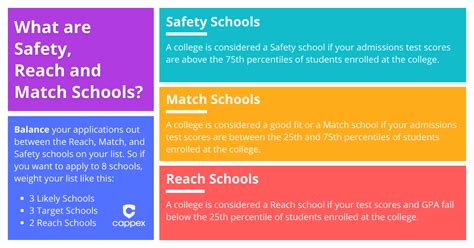A reach college is a college or university that is more selective than your academic profile suggests. In other words, it’s a college that you have a lower chance of getting into than you do of getting into your target or safety schools.

There are a few different ways to think about reach colleges. One way is to consider your academic profile. Your academic profile includes your GPA, test scores, class rank, and extracurricular activities. If your academic profile is strong, then you may have a better chance of getting into a reach college. However, even if your academic profile is not as strong, you may still be able to get into a reach college if you have other factors that make you a desirable candidate, such as strong extracurricular activities, a compelling personal statement, or a unique talent.
Another way to think about reach colleges is to consider your financial situation. If you come from a low-income family, then you may be eligible for financial aid that can help you pay for college. This can make it possible for you to attend a reach college that you might not otherwise be able to afford.
Ultimately, the decision of whether or not to apply to a reach college is a personal one. There is no right or wrong answer. However, it is important to do your research and make sure that you understand the chances of getting into the college. You should also make sure that you have a backup plan in case you do not get into your reach college.
Why Apply to a Reach College?
There are a few reasons why you might want to apply to a reach college.
- You may have a unique talent or experience that sets you apart from other applicants. If you have a strong extracurricular activity, a compelling personal statement, or a unique talent, then you may be more likely to get into a reach college, even if your academic profile is not as strong.
- You may be from a low-income family and eligible for financial aid. If you come from a low-income family, then you may be eligible for financial aid that can help you pay for college. This can make it possible for you to attend a reach college that you might not otherwise be able to afford.
- You may simply want to challenge yourself. If you are a high-achieving student, then you may want to challenge yourself by applying to a reach college. Even if you do not get into the college, the experience of applying can be valuable.
How to Apply to a Reach College
If you are thinking about applying to a reach college, there are a few things you can do to improve your chances of getting in.
- Make sure your academic profile is as strong as possible. This means getting good grades, taking challenging courses, and scoring well on standardized tests.
- Get involved in extracurricular activities. Extracurricular activities can show colleges that you are well-rounded and have interests outside of the classroom. They can also help you develop leadership skills and teamwork skills.
- Write a compelling personal statement. Your personal statement is your chance to tell colleges about who you are and why you want to attend their school. Make sure your personal statement is well-written and error-free.
- Get good letters of recommendation. Letters of recommendation can give colleges a more personal perspective on your character and abilities. Make sure to ask for letters of recommendation from teachers, counselors, or other adults who know you well.
- Apply early. Many colleges offer early decision or early action programs that allow you to apply to the school before the regular deadline. Applying early can give you a better chance of getting into the college, especially if you are a strong candidate.
What to Do If You Don’t Get Into Your Reach College
If you do not get into your reach college, don’t be discouraged. There are many other great colleges and universities out there. You may want to consider applying to a target college or a safety college. You may also want to consider taking a gap year to travel, volunteer, or work before applying to college again.
Conclusion
Applying to reach colleges can be a daunting task, but it is also a rewarding one. If you are willing to put in the work, you may be surprised at what you can achieve.
